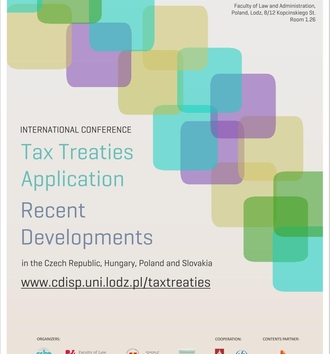Venue: Faculty of Law and Administration, University of Łódź, Poland
Date: 14 October 2016
Organizers: Centre of Tax Documentation and Studies, Foundation CDiSP
Speakers: Prof. Michal Radvan (the Czech Republic), Dr. Gergely Czoboly (Hungary), Dr. Ziemowit Kukulski (Poland), Representative of PwC (Poland), Dr. Anna Románová (Slovakia)
Target group: academics, tax practitioners (tax advisors, legal advisors, attorneys, judges, tax managers), tax officials, tax policy makers, students.
The intensity of business cooperation between entrepreneurs in the Czech Republic, Hungary, Poland and Slovakia has been rapidly growing in recent years after the accession of these countries to the European Union. Development of goods and services exchange along with export and import of capital and movement of workers create a number of issues under international tax law for entrepreneurs in those countries carrying on cross-border business activity (to name a few: taxation of business income and permanent establishment issues in particular, tax consequences of cross-border movement of workers, especially in the context of secondment and international hiring-out of labour as well as taxation of capital flows: dividends, interest and royalties).
Proper income qualification as well as appropriate interpretation of respective provisions of treaty law conditions are prerequisite for a smooth functioning of tax treaties and mutual economic growth of the contracting states. Improving the exchange of goods and services as well of capital movements shall boost the economies of those countries and facilitate economic activity of taxpayers carried on either directly or indirectly through branches or subsidiaries.
The aim of the conference is to identify crucial elements of tax treaties concluded between the Czech Republic, Hungary, Poland and Slovakia as well as tax treaty policy of those countries and to work out possible solutions to the problems and issues which arise upon their application.
The conference is going to be divided into four panels: Taxation of Business Income, Taxation of Employment Income, Taxation of Capital Investment Income and Anti-Avoidance as well as Anti-Evasion Measures. Each panel would consist of two presentations on selected topics (in total we are going to have eight speeches – two presentations per each country). Speakers of all four countries would participate in the panel discussion following the presentations in each panel.


